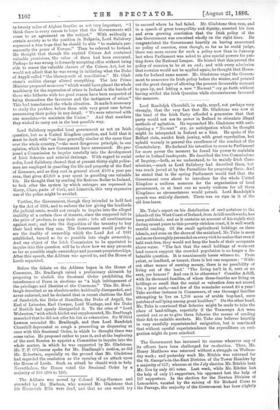Before the debate on the Address began in the House
of Commons, Mr. Bradlaugh raised a preliminary skirmish by proposing to abolish the Sessional Order prohibiting the interference of Peers in elections as " a high infringement of the privileges and liberties of the Commons." This Mr. Brad- laugh described as an obsolete order, habitually disregarded, and never enforced, and he declared that in recent elections the Earl of Sandwich, the Duke of Hamilton, the Duke of Argyll, the Earl of Leicester, Earl Cowper, Lord Wantage, and the Duke of Norfolk had openly disregarded it. To the cries of " Lord Wolverton," with which his list was supplemented, Mr. Bradlaugh remarked that he did not offer his list as exhaustive. Sir Wilfrid Lawson seconded Mr. Bradlaugh, and then Lord Randolph Churchill deprecated so rough a proceeding as dispensing at once with this Sessional Order, in which he thought there was some value. He proposed rather to pass it, and at the beginning of the next Session to appoint a Committee to inquire into the whole matter, in which he was supported by Mr. Gladstone. Mr. T. P. O'Connor spoke for Mr. Bradlaugh's motion, as did Mr. Robertson, especially on the ground that Mr. Gladstone had regarded the resolution as the opening of an attack upon the House of Lords. Such an attack he should wish to help. Nevertheless, the House voted the Sessional Order by a majority of 168 (294 to 126).


































 Previous page
Previous page